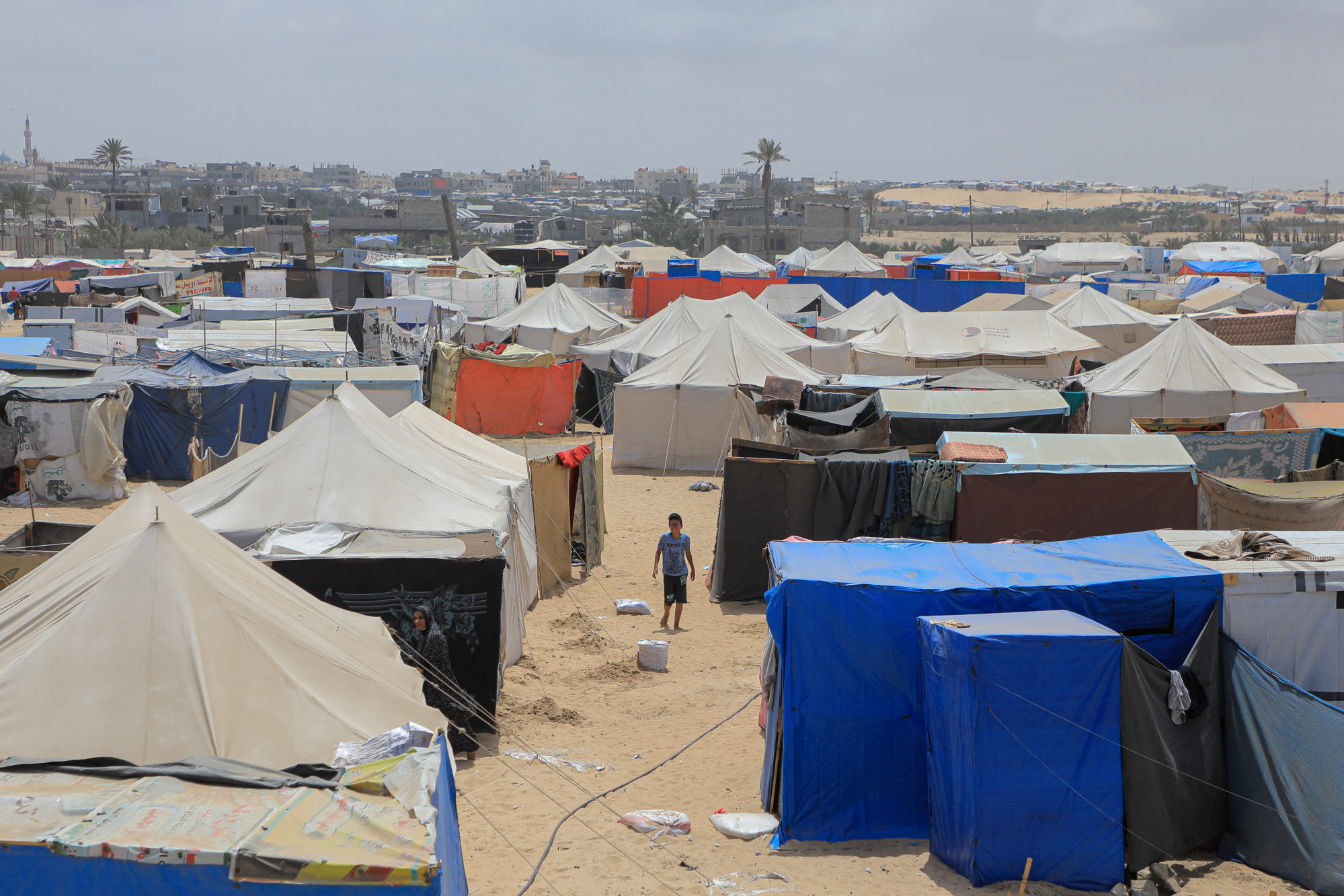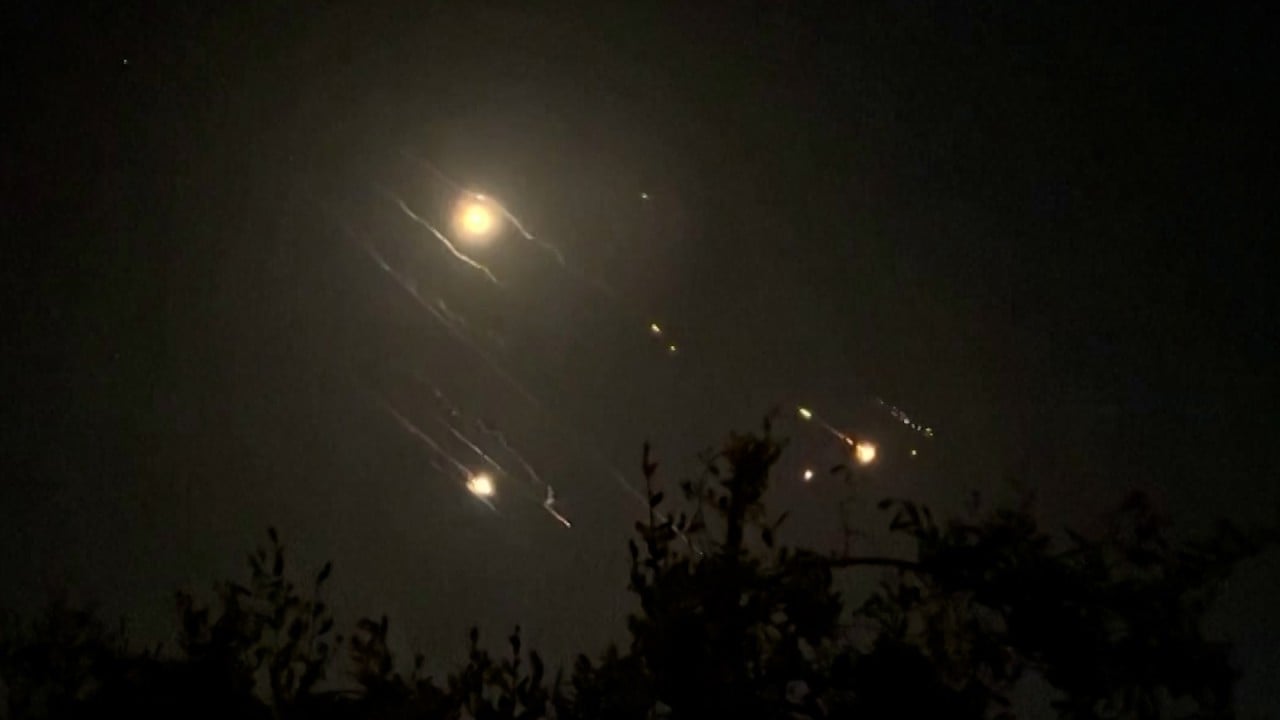
Palestinian president Abbas says US only nation capable of preventing Israel’s invasion of Rafah
- Mahmoud Abbas spoke at the World Economic Forum in Saudi Arabia. Israel is not taking part in the summit, which is being attended by ceasefire mediators
- Riyadh has called for regional stability, warning of the effects of the Israel-Gaza war. ‘Cool-headed countries and leaders and people need to prevail’
Palestinian president Mahmoud Abbas on Sunday said the United States is the only country capable of stopping an Israeli invasion of Rafah in Gaza, saying it would be “the biggest disaster in the history of the Palestinian people”.
“We appeal to the United States of America to ask Israel to stop the Rafah operation because America is the only country capable of preventing Israel from committing this crime,” Abbas said at a global economic summit in the Saudi capital Riyadh.
Israel, which has threatened for weeks to launch an all-out assault on the area, saying its goal is to destroy Hamas’ remaining battalions there, stepped up air strikes on Rafah last week.
Western countries, including Israel’s closest ally the United States, have pleaded with it to hold back from attacking the southern city, which abuts the Egyptian border and is sheltering more than a million Palestinians who fled Israel’s seven-month long assault on much of the rest of Gaza.
“What will happen in the coming few days is what Israel will do with attacking Rafah because all the Palestinians from Gaza are gathered there,” Abbas said at the World Economic Forum (WEF), adding that only a “small strike” on Rafah would force the Palestinian population to flee the Gaza strip.
Iran tells Chinese foreign minister it will not escalate violence against Israel
“The biggest catastrophe in the Palestinian people’s history would then happen.”
Israel has agreed to listen to US concerns and thoughts before it launches an invasion of Rafah, White House national security spokesperson John Kirby said later on Sunday.
Kirby, speaking to ABC, also said Israel has started to meet the commitments it made to US President Joe Biden on allowing aid into the north of Gaza.
Meanwhile, Saudi Arabia has called for regional “stability”, using the summit, attended by Gaza mediators, to warn of the effects of the war on global economic sentiment.
US Secretary of State Antony Blinken, Palestinian leaders and high-ranking officials from other countries trying to broker a ceasefire between Israel and Hamas are on the guest list for the summit in Riyadh, capital of the world’s biggest crude oil exporter.
The Gaza war along with conflicts in Ukraine and elsewhere put “a lot of pressure” on the economic “mood”, Saudi Finance Minister Mohammed al-Jadaan said at one of the first panel discussions of the two-day WEF special meeting.
“I think cool-headed countries and leaders and people need to prevail,” Jadaan said. “The region needs stability.”
The war in Gaza, which has sent regional tensions soaring, began with an unprecedented attack on southern Israel by Palestinian militant group Hamas on October 7.
The attack resulted in the deaths of about 1,170 people, mostly civilians, according to an AFP tally of Israeli official figures.
Israel estimates that 129 hostages seized by militants on October 7 are still being held in Gaza, including 34 the military says are dead.
Vowing to destroy Hamas, Israel’s retaliatory offensive has killed at least 34,454 people in Gaza, mostly women and children, according to the health ministry.
Saudi planning minister Faisal al-Ibrahim told a press conference on Saturday, previewing the summit, that the world is “walking a tightrope right now, trying to balance security and prosperity”.

“We meet at a moment when one misjudgment or one miscalculation or one miscommunication will further exacerbate our challenges.”
WEF president Borge Brende said there was “some new momentum now in the talks around the hostages, and also for … a possible way out of the impasse we are faced with in Gaza”.
However, there will be no Israeli participation at the summit.
“This is more an opportunity to have structured discussions” with “the key players” including mediators Qatar and Egypt, he said.
“There will be discussions, of course, on the ongoing humanitarian situation in Gaza” as well as on Iran, which backs Hamas and Lebanon’s Hezbollah group, he added.
Hamas releases video of 2 Gaza hostages, as it ponders Israel ceasefire deal
The US State Department said Blinken will “discuss ongoing efforts to achieve a ceasefire in Gaza that secures the release of hostages”.
Hamas said on Saturday it was studying the latest Israeli counterproposal regarding a potential ceasefire in Gaza, a day after media reports said a delegation from mediator Egypt arrived in Israel in a bid to jump-start stalled negotiations.
From the outset Saudi Arabia has worked with other regional and global powers to try to contain the war in Gaza and avoid the type of conflagration that could derail its ambitious economic reform agenda known as Vision 2030.
The kingdom also remains in talks about a landmark deal under which it would recognise Israel for the first time while strengthening its security partnership with the United States, though analysts say the war has made it more difficult.
Meanwhile the conservative Gulf kingdom, home to the holiest shrines in Islam, is trying to open up to the world, luring business leaders and non-religious tourists.
UN says 37 million tonnes of debris in Gaza could take 14 years to clear
Hosting international events such as the WEF meeting allows the kingdom to showcase social changes including the reintroduction of cinemas and the lifting of a ban on women driving.
“Eight years into Vision 2030, we have demonstrated our willingness to lead the way towards a model of transformative growth that is innovative, inclusive and sustainable,” Ibrahim said on Saturday.
Yet questions persist about just how much of Vision 2030 will be achieved and when, with special scrutiny falling on signature projects such as NEOM, a planned futuristic megacity.
In December, Jadaan, the Saudi finance minister, said officials had decided to push the time frame for some major projects past 2030, without specifying which ones, though he also noted that others would be accelerated.
Saudi Arabia is projecting budget deficits through 2026 and GDP growth was nearly flat last year after a series of oil production cuts.
Jadaan stressed on Sunday that non-oil GDP growth was “very healthy” at 4.4 per cent and that “Vision 2030 is about, actually, the non-oil GDP”.
Additional reporting by Reuters

.png?itok=arIb17P0)
